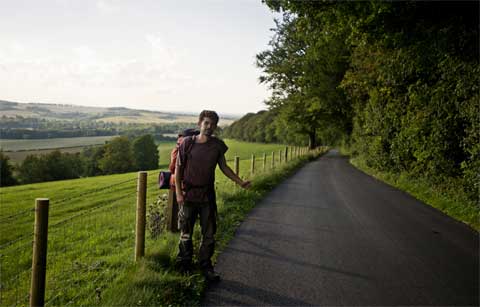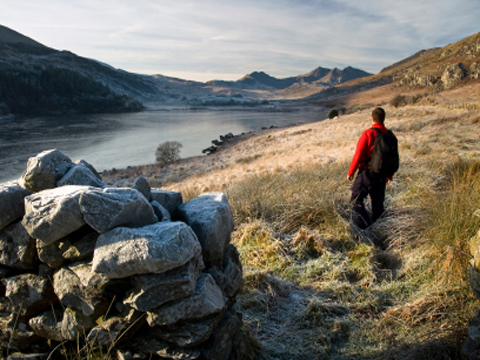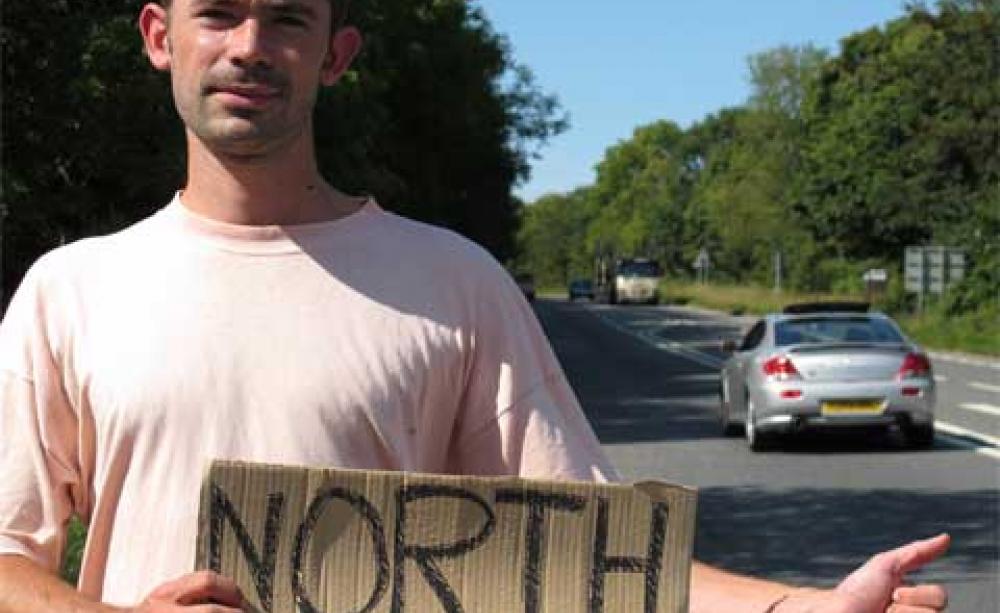A survey published by the AA last month found that only 9 per cent of drivers would be likely to pick up a hitchhiker, compared to 25 per cent two years ago. The media took this as clear-cut confirmation of the death of hitchhiking. Yet whilst it is true that there are a lot less of us thumbing on the roads than there used to be, in many years of hitching I've never once been left stranded. It's important to put these figures from the survey in perspective - one car in ten still seem like pretty good odds to me. Besides, statistics don't always tell the real story.
Last week I hitched from Oxford to Salisbury, a two hour drive which took me four. I chatted with a technician about cuts to the sciences, encouraged someone to take to the road themselves, and had an hour's lecture on how to make my own diesel from chip fat. There aren't many forms of transport where you find all that. And regardless of these pleasures, hitchhiking should be thriving. With petrol prices rising weekly, people struggling to make ends meet, record youth unemployment and an urgent need to cut carbon emissions, a revival seems to be long overdue. It happened in other countries; part of Cuba's solution to its oil crisis was a boom in hitching. It is illegal for a state vehicle to drive past a hitcher without stopping.
 Hitchhiking goes as far back as the Bible. The apostle Philip thumbs a ride with an Ethiopian eunuch in his chariot. Halfway home Philip takes him down to a river and baptises him, whereupon he disappears. (Acts 8: 26-39). The charioteer carries on his way 'full of joy' (Wechner, 2011). When you encounter a stranger, it suggests, you never know what you're going to get. Hitchhiking, with two or more strangers placed in an enclosed space for a length of time, is a particularly good symbol for this uncertainty.
Hitchhiking goes as far back as the Bible. The apostle Philip thumbs a ride with an Ethiopian eunuch in his chariot. Halfway home Philip takes him down to a river and baptises him, whereupon he disappears. (Acts 8: 26-39). The charioteer carries on his way 'full of joy' (Wechner, 2011). When you encounter a stranger, it suggests, you never know what you're going to get. Hitchhiking, with two or more strangers placed in an enclosed space for a length of time, is a particularly good symbol for this uncertainty.
A rash of 80s horror movies is often partly credited with the demise in hitching. The best known is The Hitcher, starring Rutger Hauer as a psychotic and motiveless hitchhiker, pursuing a suitably tight-jeaned and wind-swept young man. It is his very lack of motive that makes him terrifying. The idea now is that strangers are unknowable. You cannot risk trusting them, because you cannot understand them.
But are we more scared of strangers than we used to be? It seems more complex than that, for hitchhiking is not dead, just woefully under practiced. A friend recently carried out a study of a hundred lifts and found no shortage of people ready to stop. Their average wait was 24 minutes, not much more than a bus.
 On the road
On the road
Perhaps it is the hitchers that are the ones that are scared of strangers, rather than the drivers. What if my generation, the twenty-somethings - the supposedly tough and fearless youth - are the ones too scared to relinquish their control? The AA survey bears this out; out of every group surveyed, it was most likely to be the 18-24 year olds who had never hitched. Ninety-three per cent of them. After all, we have grown up in a more controlled and ordered environment than any generation before us. What if it is us that cannot bear the uncertainty, who see strangers increasingly less like bringers of joy and more like Rutger Hauer? Certainly I am picked up less by young drivers than by anyone else, and not because young people are less likely to own cars. Enough of them give me the finger as they drive past.
Certainly there is a risk in hitchhiking, for both the hitcher and the hitched. Pretending there isn't is facile. But hospitality can only be rendered risk free by vetting one's guest so carefully that all possibility of hospitality is lost. There is something to be said for risks that are worth taking. We live in a world in which we attempt to control as much as possible. We do this, perversely, by destroying the sorts of things that truly keep us safe. I am thinking in particular of community and of an openness to strangers. Certainly take precautions, as you would with any travel. Hitch with someone else if you like, or only in the daytime, or only in countries where you speak the language. But let's also take precautions to avoid living in a world where we have no trust in strangers, and understand the implications of creating that world.
 In the Second World War there was a boom of goodwill towards the servicemen and women hitching home on leave. The baton was taken up by the culture of the sixties, and those who had hitched through the wars now had cars and a debt to repay. Many of those who pick me up now hitched in the sixties and seventies, and are looking to reciprocate the hospitality shown them. They were strangers once, and they open their doors to the strangers of today. So the cycle continues, for the moment. Yet I wonder who will pick up the next generation of hitchhikers as they stand by the road for weeks on end with their signs dissolving in the rain. If my generation does not hitch, this cycle of hospitality slows to a halt, and fear of the stranger knows no bounds. Hitchhiking is not a dead art, but it may well be one generation away from extinction.
In the Second World War there was a boom of goodwill towards the servicemen and women hitching home on leave. The baton was taken up by the culture of the sixties, and those who had hitched through the wars now had cars and a debt to repay. Many of those who pick me up now hitched in the sixties and seventies, and are looking to reciprocate the hospitality shown them. They were strangers once, and they open their doors to the strangers of today. So the cycle continues, for the moment. Yet I wonder who will pick up the next generation of hitchhikers as they stand by the road for weeks on end with their signs dissolving in the rain. If my generation does not hitch, this cycle of hospitality slows to a halt, and fear of the stranger knows no bounds. Hitchhiking is not a dead art, but it may well be one generation away from extinction.
This is not an intellectual argument, but a practical one. Stick out your thumb and see what happens. Take a car off the roads, save yourself money, and give someone the opportunity to show their hospitality. Hitch to work one day. Find someone who has hitchhiked before, and go with them. Hitchwiki.org is a particularly good resource. And, if you can find them, stop and pick someone up. Without beginning to cultivate a deep empathy for the stranger, and without learning to trust the unpredictable nature of the world, I find it hard to see what else we can achieve.
Further information:
The AA (2011) Hitch-hiking. Has It Reached the End of the Road?
Wechner, B. (2011) Hitch-Hiking in the Bible
| READ MORE... | |
 |
GREEN LIVING The eco travel guide to England Boasting vibrant cities, countless historical treasures and lush rolling countryside, England has much to offer green travellers, says Green Living Editor Ruth Styles |
 |
HOW TO MAKE A DIFFERENCE Using bike-powered theatre to communicate climate change Every summer a team of cyclists set off across Britain stopping along the way to perform an eco-themed play to schools, festivals and communities. Welcome to the Otesha Project... |
 |
HOW TO MAKE A DIFFERENCE Why we need to stop trying to 'save the planet' and just realise our place in it In an extract from his new book the Jolly Pilgrim, Peter Baker argues that a Gaian consciousness is slowly emerging out of our efforts to overcome climate change and other environmental challenges |
 |
GREEN LIVING Five of the best… British walks Make friends, exercise and enjoy Britain’s natural beauty while you walk, says Noah Lee |
 |
HOW TO MAKE A DIFFERENCE Saddle up: how Brighton's bike train is greening the notorious school run Come Friday morning and a group of kids and their parents converge to begin Brighton's Bike train cycle to school. Could this be the beginning of the great two-wheeled school run revolution? Jan Goodey reports |







